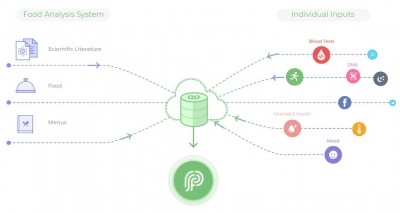In 30 years, every successful food company will be a ‘personalised food company’: Nutrino CSO

Food manufacturers today are no stranger to terms such as ‘healthy indulgence’, ‘good-for-you’, ‘clean label’ and ‘health and wellness’, and behind these marketing buzzwords is a growing public desire for foods that both taste good and are good for the health.
According to Israeli personalised nutrition company Nutrino, however, there are still a lot of common misunderstandings about what foods are healthy.
Nutrino collects data on both food composition and individuals’ health and, through its trademarked FoodPrint technology, combines the two to analyse how people’s bodies react to different foods.
It then makes personalised suggestions, recommending the foods that are the healthiest possible choices for the individual in question.
According to previous research, the results can be surprising. In 2015, researchers at the Weizmann Institute in Israel measured the blood glucose levels of 800 people as they ate almost 47,000 meals. They found that the blood sugar level of some individuals rose more after eating sushi than sugary ice cream. There was also “high variability” in individual blood glucose responses to the same foods.
“People have always had unique food and eating preferences,” co-founder and chief scientist of Nutrino Yaron Hadad told FoodNavigator. “Now, for the first time in history, people can measure how different foods affect their bodies, and we are learning that foods affect different people very differently.
“Both of these trends are only going to continue as new technologies will become available, and as consumers will learn this about themselves, they will expect to eat foods and products that address their individuality."
Hadad calls the approach 'mathematical nutrition'.
'The future of food is in personalisation'
For Tel Aviv-headquartered Nutrino, then, it's a 'do-or-die' moment for manufacturers.
“Companies who fail to appreciate this will struggle over the coming decade, and within three decades every successful food company will be a ‘personalised food company’.”
Hadad said it is “definitely possible” for big, multinational food manufacturers to tap into the personalised nutrition trend, and that Nutrino has received “a lot of interest” from the food industry.
“I believe that the future of food is in personalisation, together with innovative ways of producing it,” he said.
While Nutrino has not publicly announced any partnerships with food companies yet (it has partnered with a number of diabetes and maternal nutrition companies, including Medtronic, Dexcom and Welltok), Hadad said this will happen “further down the road”.
For the last two years, the company has focused on the diabetes market – type one and two as well as prediabetes – but will be extending this to “new markets”.
In April this year, the start-up raised $8 million in a series A funding round from Pereg Ventures, Nielsen Ventures, Gandyr Group and a number of business angels, which will help expand its commercial reach.
There’s an app for that.
People can live long, healthy lives by having an active lifestyle and varied diet with lots of fresh fruit, vegetables and wholegrains – and they have been doing so for millennia – without measuring, recording and possible obsessing over every single glucose spike or fall.
So why does the average person need this technology?
“The person eating the average American diet can definitely benefit simply by eating a wholesome diet,” Hadad says, “no doubt about that. That being said, individuals do respond differently to different foods, and quite often in a very counter-intuitive way.
“As an example, I have huge glucose spikes from wheat and grapefruit, while others learn that these foods sit with them just fine. This means that one can go far beyond the general advice - the average person can improve their health even more by knowing how food affects them.
“Moreover, and more importantly, knowledge is power, and learning about your body is the most empowering health tool. Imagine learning that some food you really love but normally avoid - as the common wisdom says it's unhealthy - is actually fine for you. Wouldn't you like to know that?”
Profiting from personal data
Data on food is gathered from official sources, such as on-pack nutrition labels, manufacturer websites or restaurant menus, and it already has some 1.6 million products in the database to date.
For individuals it collects any data on nutrition or metabolism. “That means practically everything related to health,” says Hadad.
This personal and genetic information is gleaned from over 100 data sources, including blood test results, wearable devices like FitBit and Apple Watch or medical devices such as continuous glucose monitors, insulin pumps and blood pressure monitors.
Nutrino’s business model is entirely dependent on people's willingness to share personal data. But could a growing awareness of companies collecting personal information, and the fall-out from scandals such as Cambridge Analytica, spark a backlash against the harnessing of personal data for commercial profit?
“This can always happen,” admits Hadad.
He adds, however, that Nutrino’s technology is compliant with the US Health Insurance Portability and Accountability Act (HIPAA) and that the data is “properly anonymised”.
The website says it is also in compliance with Europe’s recent General Data Protection Regulation (GDPR).
“We also only collect data on what's related to nutrition, and use the data collected to help individuals and their families live healthier, longer lives - a noble goal.
“I believe that consumers' awareness as well as friction with other data companies has been around such companies monetising users’ data not for the benefit of the users themselves. This is not the case here.”








